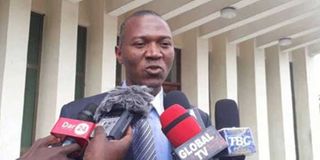Tanzania, S. Africa ICT experts search for health, agriculture innovative solutions

What you need to know:
To begin with, the experts on Thursday, September 6 met in Dar es Salaam to discuss various issues ahead of implementation of the joint programme.
Dar es Salaam. Experts in Information and Communication Technology (ICT) from Tanzania and South Africa have embarked on a project to address challenges in the countries' agriculture and health sectors by using technology.
The experts through a newly launched joint programme dubbed 'Bilateral ICT Application Technology Development Programme' are looking at ways of addressing challenges in various areas including distribution of essential medicines, issuance of soft loans and distribution of quality seeds to farmers, among others.
To begin with, the experts on Thursday, September 6 met in Dar es Salaam to discuss various issues ahead of implementation of the joint programme.
Among others, during a three-day meeting, participants will outline the common challenges facing agriculture and health sectors in both countries and come up with solution based approaches to curb the challenges.
Addressing participants during a joint meeting, the director general of the Tanzania Commission for Science and Technology (Costech), Dr Amos Nungu, said he was optimistic that the joint programme would complement the countries' efforts and commitment to addressing challenges facing farmers and would enhance health settings in the countries.
"This programme is part of mutual cooperation between Tanzania and South Africa. The impacts of the programme would benefit both countries in addressing challenges in agriculture and health sectors," he said.
He added "Our local innovators will have a privilege to share experience and knowledge with their counterparts from South Africa and come up with solution based recommendations."
For his part, Mr Frans van Aardt, who attended the meeting as a representative of the High Commissioner of South Africa, stated "South Africa has a good history of working with the Tanzanian government in addressing a number of issues. I'm optimistic that the resolutions that will come out as a result of this joint meeting will be fundamental towards curbing the challenges in agriculture and health sectors."
At same occasion, Tanzania's senior research officer from the Ministry of Education in the department of Science and Technology, Dr Rodgers Msuya, asserted that the joint programme would also help in creating jobs for Tanzanians and would deepen socio-economic and cultural relations between Tanzania and South Africa.
"The programme would also incorporate young local innovators to share experience and knowledge with their SA's counterparts in field of ICT," he said.
Commenting further on the joint programme, the Costech researcher and programme coordinator Judith Kadege expounded that the programme aimed at looking at ways to come up with proper ICT based solutions to curb challenges in agriculture and health sectors in both countries.
She further asserted that at the end of the joint meeting, the programme team will outline the proposed common challenges in which the interested innovators will be required to submit their proposals to the commission amid issuance of grants to enable them to undertake the selected assignments in compliance with innovation skills and ICT.
"Next time we will also look forward to addressing challenges facing other key sectors using technology," she said.
According to her, the joint programme was launched following agreement reached by the ICT stakeholders during the 2017 joint meeting held in Dar es Salaam in which, among others, the stakeholders called for formulation of a joint programme whose objective was to addressing challenges facing the two governments' key sectors.




